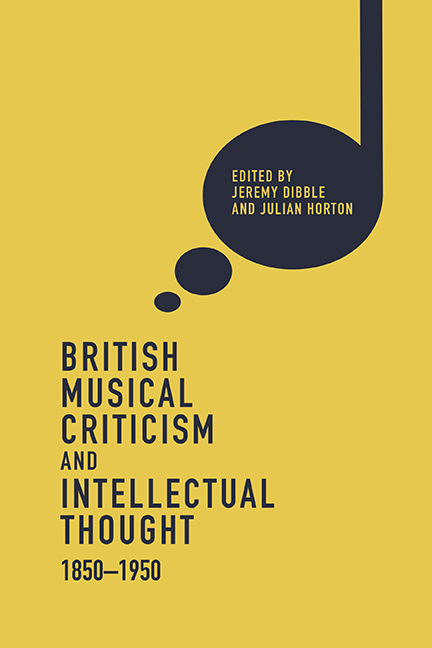Book contents
- Frontmatter
- Dedication
- Contents
- List of Illustrations
- List of Contributors
- Acknowledgements
- Introduction: Trends in British Musical Thought, 1850–1950
- 1 Avoiding ‘Coarse Invective’ and ‘Unseemly Vehemence’: English Music Criticism, 1850–1870
- 2 Spencer, Sympathy and the Oxford School of Music Criticism
- 3 Free Thought and the Musician: Ernest Walker, the ‘English Hanslick’
- 4 Ernest Newman and the Promise of Method in Biography, Criticism and History
- 5 ‘Making Symphony Articulate’: Bernard Shaw's Sense of Music History
- 6 Analysis and Value Judgement: Schumann, Bruckner and Tovey's Essays in Musical Analysis
- 7 The Scholar as Critic: Edward J. Dent
- 8 Russia and Eastern Europe
- 9 Anti-Intellectualism and the Rhetoric of ‘National Character’ in Music: The Vulgarity of Over-Refinement
- 10 Chosen Causes: Writings on Music by Bernard van Dieren, Peter Warlock and Cecil Gray
- 11 ‘Es klang so alt und war doch so neu’: Vaughan Williams, Aesthetics and History
- 12 Constant Lambert: A Critic for Today? A Commentary on Music Ho!
- 13 The Challenge to Goodwill: Herbert Howells, Alban Berg and ‘The Modern Problem’
- 14 Hans Keller: The Making of an ‘Anti-Critic’
- Select Bibliography
- Index
- Titles listed here were originally published
5 - ‘Making Symphony Articulate’: Bernard Shaw's Sense of Music History
Published online by Cambridge University Press: 17 July 2019
- Frontmatter
- Dedication
- Contents
- List of Illustrations
- List of Contributors
- Acknowledgements
- Introduction: Trends in British Musical Thought, 1850–1950
- 1 Avoiding ‘Coarse Invective’ and ‘Unseemly Vehemence’: English Music Criticism, 1850–1870
- 2 Spencer, Sympathy and the Oxford School of Music Criticism
- 3 Free Thought and the Musician: Ernest Walker, the ‘English Hanslick’
- 4 Ernest Newman and the Promise of Method in Biography, Criticism and History
- 5 ‘Making Symphony Articulate’: Bernard Shaw's Sense of Music History
- 6 Analysis and Value Judgement: Schumann, Bruckner and Tovey's Essays in Musical Analysis
- 7 The Scholar as Critic: Edward J. Dent
- 8 Russia and Eastern Europe
- 9 Anti-Intellectualism and the Rhetoric of ‘National Character’ in Music: The Vulgarity of Over-Refinement
- 10 Chosen Causes: Writings on Music by Bernard van Dieren, Peter Warlock and Cecil Gray
- 11 ‘Es klang so alt und war doch so neu’: Vaughan Williams, Aesthetics and History
- 12 Constant Lambert: A Critic for Today? A Commentary on Music Ho!
- 13 The Challenge to Goodwill: Herbert Howells, Alban Berg and ‘The Modern Problem’
- 14 Hans Keller: The Making of an ‘Anti-Critic’
- Select Bibliography
- Index
- Titles listed here were originally published
Summary
Wagner was the literary musician par excellence … he produced his own dramatic poems, thus giving dramatic integrity to opera, and making symphony articulate. A Beethoven symphony (except for the articulate part of the ninth) expresses noble feeling, but not thought: it has moods, but no ideas. Wagner added thought and produced the music-drama.
As a music critic, Bernard Shaw (1856–1950) was nothing if not honest in his appraisals. He was also scathing, cantankerous and wilfully given to a hectoring and didactic strain of pronouncement which made him the bete noir of Victorian musical culture and – in some respects – its most implacable adversary. Between 1876 and 1898 (when he published The Perfect Wagnerite) he produced numerous columns for the London press (especially The Star, where he wrote from February 1885 under the pseudonym Corno di Bassetto, and The World, where he wrote from May 1890 as ‘GBS’), columns which now amount to an invaluable (if idiosyncratic) record of English musical life at the close of the nineteenth century. Thereafter, as his career as a dramatist took hold and made him famous, Shaw wrote much less frequently on musical matters, but he continued to publish essays and correspondence on music (including two notable exchanges with Ernest Newman) throughout his long lifetime. His last such publication appeared nine days after his death in November 1950.
The three stout volumes of Shaw's collected music criticism published in 1981 as Shaw's Music (and edited by his indefatigable bibliographer and scholarly advocate, Dan H. Laurence) give due notice of the formative role and abiding presence of music in Shaw's development as a writer. They also attest a striking and pervasive relationship between Shaw's perhaps unrivalled experience of British public musical life and his own convictions about musical meaning. Shaw's journalism extends from reviews of Clara Schumann's performances in London and Wagner's visits there in the 1870s to appraisals of Richard Strauss and Arnold Schoenberg shortly before and after the First World War. As late as 1923 (in his preface to the fourth edition of The Perfect Wagnerite) he was still chiding the British public because of its failure to recognize the sea-change that had occurred in English music over the course of his career.
- Type
- Chapter
- Information
- British Musical Criticism and Intellectual Thought, 1850–1950 , pp. 102 - 122Publisher: Boydell & BrewerPrint publication year: 2018



